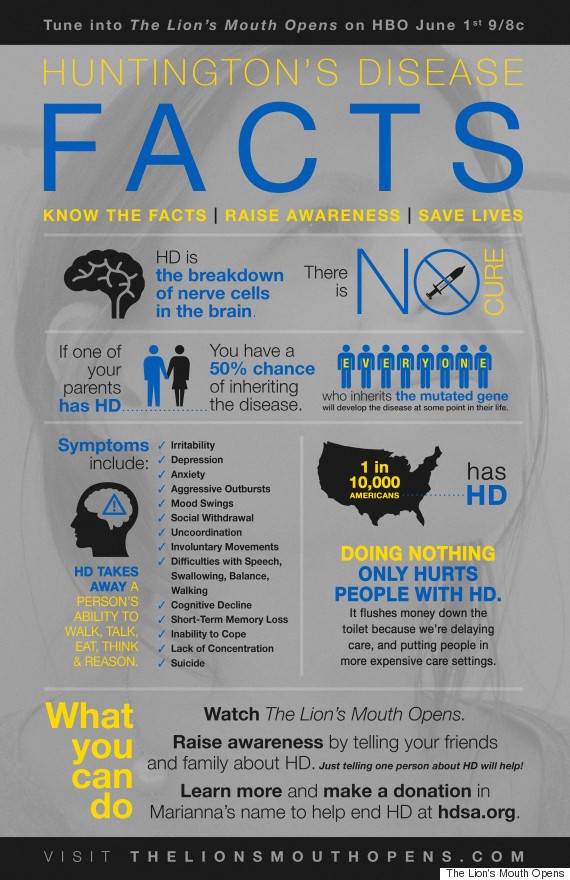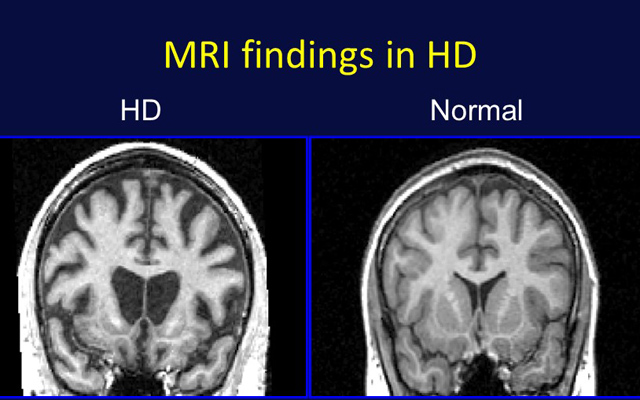
What is Huntington’s Disease?
Huntington’s Disease is a genetic mutation in the huntingtin chromosome. If a child receives this mutated chromosome from their parent they will develop the disease and start to experience the symptoms in about their 30s or 40s, sometimes earlier. When the chromosome becomes active it make too much of the huntingtin protein which becomes toxic and kills cells. It is a progressive disease so it gets worse with time, as more cells die. The cell death occurs in the basal ganglia which controls movement, emotion and other cognitive functions. Huntington’s is often comorbid with Alzheimer’s and depression because it kills cells connected to centers of emotion and memory. (see video 1)
The basal ganglia controls movements in two ways. There is the excitatory pathway, or direct pathway, that promotes action by increasing activity in the cortex, and there is the inhibitory pathway, or indirect pathway, that decreases activity to “brake” motions. In Huntington’s, the inhibitory neurons are killed reducing braking and causing flailing motions (chorea) . Other symptoms include muscle rigidity, difficulty with eye and speech movements, and impaired posture.
Video 1: What is Huntington’s?
This brain scan shows the cell death in the region of the basal ganglia in a patient with HD
Living with Huntington’s: Testing
Since Huntington’s is genetic, if a parent has the chromosome, there is a 50% chance of passing the gene on to a child, since each child receives one chromosome from each parent. This leads to a lot of ethical questions about testing. They can prenatally test an embryo if the parent has the disease, to determine if it was passed on. This leads to ethical concerns about what to do with the child if it does have the mutated chromosome; abort? If the child is not prenatally tested they can do accurate blood testing to determine the presence of the gene, but it does not tell when symptoms will appear. Again, it is unclear on the ethics of parents having a child tested for something they may not want to know. Generally this genetic test is held off until the child is 18. But even then, do you want to know that you’re going to die early, in a possible state of not being able to control your body and have many cognitive deficits? (see video 2) You lose the ability to walk, remember words or faces, control impulses and emotions, and overall take care of yourself. This is by no means an easy decision.
If you’ve ever watch House, M.D., Olivia Wilde’s character is faced with the choice whether to get tested or not. (see video 3)
Treatment
There is no cure for Huntington’s. There are no medications that slows the progression, so there is only medications to manage symptoms. There are neuroleptics to control the random motion, antidepressants for the psychological symptoms like depression, and mood stabilizing drugs. Sometimes a medication that helps with one symptom worsens another, and there are always side effect concerns. There are many therapies to help also, like occupational therapy to make the home safe, and counseling for the patient and family. Overall more research is needed to help patients with Huntington’s so check out http://hdsa.org/ on how to get involved.
References
Huntington’s Disease. (2015). Retrieved from http://learn.genetics.utah.edu/content/disorders/singlegene/hunt/
Hall, A. (2015, June 1). What It’s Like To Face The Threat Of Huntington’s Disease. Retrieved from http://www.huffingtonpost.com/2015/06/01/huntingtons-disease-facts_n_7485812.html
Genetic Testing & Family Planning. (n.d.). Retrieved from http://hdsa.org/living-with-hd/genetic-testing-family-planning-prenatal-testing/
Huntington’s Disease. (2004, January 1). Retrieved September 30, 2015, from https://caregiver.org/huntingtons-disease
Ward, J. (2010). Action. In The Student’s Guide to Cognitive Neuroscience (3rd ed., pp. 4-7). Hove, East Sussex: Psychology Press.


Recent Comments